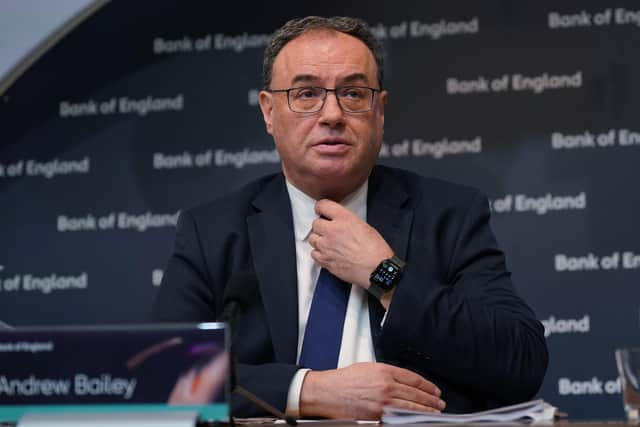Interest rates rise again as economic stagnation beds in
Decision makers on the bank’s Monetary Policy Committee (MPC) agreed to the widely expected move yesterday, rising the base rate from 4 per cent to 4.25 per cent.
However, its accompanying economic forecast upgrade the UK’s long-term prospects fractionally, saying the bank now expected marginal growth of 0.4 per cent in the second quarter of the year, up from the 0.4 per cent decline in GDP foreseen by the bank last month.
Advertisement
Hide AdAdvertisement
Hide AdNonetheless, the rate rise will be seen as yet another indicator that the UK’s economic woes have a considerable distance left to run.


According to figures from trade association UK Finance, the latest rise will typically add a further £23.71 per month – or more than £284 per year – to the cost of a tracker mortgage.
This was described as the “latest body blow” to household finances by debt charity StepChange.
Yesterday’s decision was the 11th consecutive occasion time the Bank has hiked interest rates.
Advertisement
Hide AdAdvertisement
Hide AdThe MPC recognised the recent period of volatility in the global banking sector, after the collapse of the US’s Silicon Valley Bank and the rescue takeover of Credit Suisse, but stood firm in its mission to bring inflation back down to its 2 per cent target from the current 10.4 per cent rate.
“The economy has been subject to a sequence of very large and overlapping shocks,” policymakers said.
“Monetary policy will ensure that, as the adjustment to these shocks continues, CPI inflation will return to the 2 per cent target sustainably in the medium term.”
News of the interest rate rise came as a new study found the average council tax bill will increase by 5.1 per cent, further exacerbating financial difficulties in households while councils across the country simultaneously make significant cuts to services.
Advertisement
Hide AdAdvertisement
Hide AdGovernment figures released yesterday show the average bill will be £2,065 next year.
The Conservative-led County Councils Network (CCN) which represents local authorities providing services to nearly half of the population in England, said the combination of a 4.8 per cent increase in direct local government funding and council tax flexibilities in 2023-24 is not enough to cover rising costs and growing demand.
Carl Les, CCN finance spokesman and Conservative leader of North Yorkshire County Council, said: “We understand that residents are in the midst of a cost-of-living crisis, and many of us have reluctantly proposed maximum council tax rises.”
“The medium-term outlook looks bleak unless these higher costs are recognised and councils are given longer-term financial certainty, alongside delivering long-promised fair funding reforms.”
